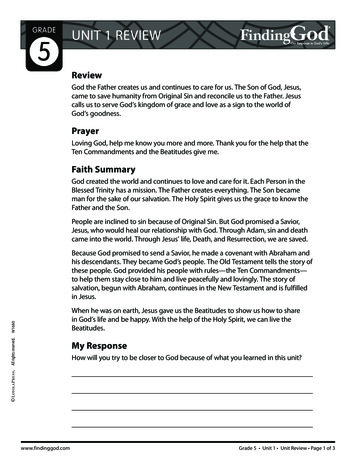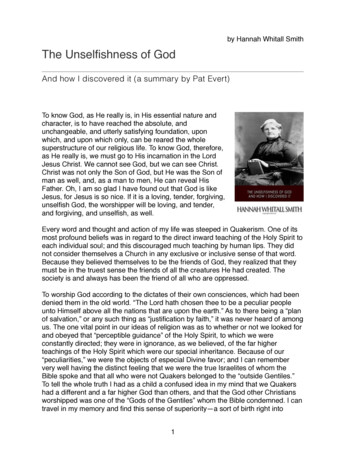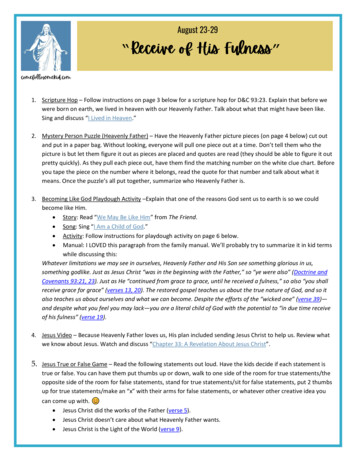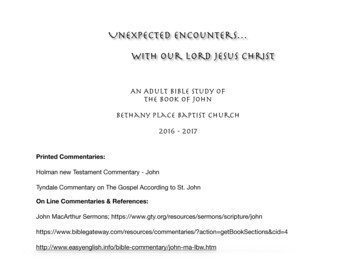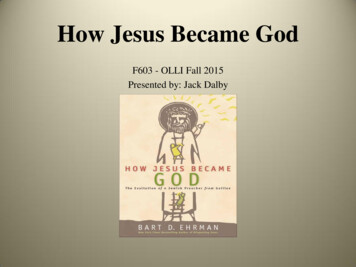
Transcription
How Jesus Became GodF603 - OLLI Fall 2015Presented by: Jack Dalby
The Divine Continuum
Three Models of the Divine Human1) Gods Who Temporarily Become Human (TheRoman gods Jupiter and Mercury were said tohave taken on mortal guise to walk thecountryside.)2) Divine Beings Born of a God and a Mortal(Alexander was said to be the son of Zeus and amortal woman.)3) A Human Who Becomes Divine (Julius Caesarwas voted into divinity by the Roman Senateafter his death.)
Divine Beings In Ancient Judaism Unlike pagans, Jews were henotheists. But there are other divine beings. The Hebrew Bible tells ofangels, demons, cherubim and seraphim. They are far more powerful than humans, but they exist in acontinuum of power. Some are more powerful than others. Some of the more powerful are the angels Michael, Gabrieland Raphael. In Genesis, the “Sons of God” marry the “daughters ofman” and have children; the “sons of God” are angels, as ismade clear in the Books of Job and Psalms. God alone was to be worshipped, but many Jews still paidhonor and feared these other divine beings.
How Many Old Testament Gods? And God said, let us make man in our image. Genesis 1:26And the Lord God said, Behold, then man is become as one of us, to knowgood and evil. Genesis 3:22Let us go down, and there confound their language. Genesis 11:7The Old Testament God is a “god of gods” who is worshiped by the othergods. For the LORD your God is God of gods, and Lord of lords.Deuteronomy 10:17Worship him, all ye gods. Psalm 97:7No other god is like him. Among the gods there is none like unto thee, OLord. Psalm 86:8He is better than the other gods. Who is like unto thee, O LORD, amongthe gods? Exodus 15:11Thou shalt have no other gods before me. . Thou shalt not bow downthyself to them, nor serve them. Exodus 20:3-5
God the Almighty“In the beginning, God created the heavensand the earth. The earth was without form andvoid, and darkness was over the face of the deep.And the Spirit of God was hovering over the faceof the waters.” – Genesis 1:1-2 ESV
God the Not So Almighty“And they heard the sound of the LORDGod walking in the garden in the cool of the day,and the man and his wife hid themselves fromthe presence of the LORD God among the treesof the garden. But the LORD God called to theman and said to him, “Where are you?” – Genesis 3:8-9ESV
How Did Jesus Become God?Rather than ask, “Did the earliestChristians believe that Jesus was God?,” we needto rephrase the question slightly and ask, “Inwhat sense did the earliest Christians think ofJesus as God?” – Bart Ehrman, How Jesus Became God
The Jesus Of History?
Our Sources
Oral Traditions About JesusFrom J2C Vol 3: 5:22-8:35
The Letters of Paul Paul is credited with writing 13 letters. They accountfor nearly half of the New Testament’s 27 books. Undisputed: Romans, 1 Corinthians, 2 Corinthians,Galatians, Philippians, 1 Thessalonians, Philiemon Deutero-Pauline Epistles: Ephesians, Colossians, 2Thessalonians Pastoral Epistles: 1 Timothy, 2 Timothy, Titus
Problems With Gospel Sources We have no original copies of any of the gospels. The gospels were written 35-70 years after the eventsthey describe. Jesus spoke Aramaic. The gospels were written inGreek. The gospels are translations. The gospels were written anonymously and by multipleauthors. Scholars believe that the narrative and timeline ofJesus’ life were created by the author(s) of Mark. Historians believe that important stories and sayingswere added well after the fact.
The Synoptic Gospels The term synoptic comes from the Greek syn,meaning "together", and optic, meaning"seen". The gospels of Matthew, Mark, and Luke arereferred to as the Synoptic Gospels becausethey include many of the same stories, often inthe same sequence, and the same wording,indicating a literary interdependence whenthey are seen together.
The Gospel Of Mark The Gospel of Mark is our earliest gospel.It was written around 65-70 CE.The authorship is unknown.Mark took oral and perhaps written stories of Jesus andcreated a narrative. Mark’s message is to establish Jesus as the messiah sentfrom God to fulfill the Jewish scriptures. Jesus’ followers struggle to grasp who he is. The “messianic secret” describes Jesus’ desire to keephis identity secret.
The Gospel Of Matthew The Gospel of Matthew was written around 80-85CE.The Gospel of Matthew is anonymous.Matthew copied/edited much of the Gospel of Mark.It contains additional stories from “Q” and “M.”He adds several important stories including Jesus’genealogy, his birth and the Sermon on the Mount. Matthews main emphasis is the Jewishness of Jesus,the importance of following Jewish law and the factthat Jesus is fulfilling Old Testament prophecy. Ironically, Matthew also passionately attacks Jewishleaders.
The Gospel Of Luke The Gospel of Luke is believed to have been writtenafter the Gospel of Matthew, around 85-90CE. Like Matthew and Mark, Luke is anonymous. It is a 2-volume set, with the Acts of the Apostles. Luke uses many of the stories found in Mark. It contains additional stories from “Q” and “L.” Luke presents different birth and genealogy stories. Luke presents the only childhood story of Jesus. Luke may have been a gentile. Luke’s emphasis is on how salvation moved from Jewsto non-Jews. He portrays Jesus as a prophet.
“Q”The Q source, (from the German Quelle,meaning "source") is a hypothetical writtencollection of sayings of Jesus defined as thecommon material found in the Gospels ofMatthew and Luke, but not in their other writtensource, the Gospel of Mark. According to thishypothesis, this ancient text was based on theOral Traditions of the Early Church. – Wikipedia, 9/21/13
The Gospel Of John The Gospel of John was written around 95 CE. Its authorship is unknown. Unlike his 1 year ministry in the synoptics, Jesuspreaches for nearly 3 years in the Gospel of John. The gospel follows a similar plot line but uses differentstories. It is thought that this gospel was written for Jews whobelieved Jesus was the messiah, but had been excludedfrom their local synagogue. Unlike the synoptics, Jesus is portrayed as divine, thepre-existent word of God.
The First New TestamentIn 367 Athanasius, bishop of Alexandria,wrote his annual letter to his churchesspecifying, among other items, the limits ofproper scriptural reading. In doing so, he refersto the oldest list of the twenty-seven booksgenerally regarded as the New Testament. Thisis not what we would refer to as a modern biblebecause there was not yet a single book.
JosephusAt this time there appeared Jesus, a wise man ifindeed one should call him a man, for he was a doer ofstartling deeds, a teacher of people who receive the truthwith pleasure. And he gained a following both amongmany Jews and among many of Greek origin. He was theMessiah . And when Pilate, because of an accusationmade by the leading men among us, condemned him tothe cross, those who had loved him previously did notcease to do so. For he appeared to them on the third day,living again, just as the divine prophets had spoken ofthese and countless other wondrous things about him.And up until this very day the tribe of Christians, namedafter him, has not died out. – Antiquities 18:3.3 (circa 90 CE)
Non-Christian Sources The first is from 112 CE, from the Roman Governor, Plinythe Younger to the Emperor Trajan“ they were accustomed to meet on a fixed day beforedawn and sing responsively a hymn to Christ as to a god,and to bind themselves by oath, not to some crime, but notto commit fraud, theft, or adultery, not falsify their trust,nor to refuse to return a trust when called upon to do so Accordingly, I judged it all the more necessary to find outwhat the truth was by torturing two female slaves whowere called deaconesses. But I discovered nothing elsebut depraved, excessive superstition. “
Non-Christian Sources The next comes from 115 CE, from the Roman historian,Tacitus:"Consequently, to get rid of the report, Nero fastened the guiltand inflicted the most exquisite tortures on a class hated fortheir abominations, called Christians by the populace.Christus, from whom the name had its origin, suffered theextreme penalty during the reign of Tiberius at the hands ofone of our procurators, Pontius Pilatus, and a mostmischievous superstition, thus checked for the moment, againbroke out not only in Judea, the first source of the evil, buteven in Rome, where all things hideous and shameful fromevery part of the world find their center and become popular.”
Discussion Topic 1Discuss the following with your table mates:What are the strengths and weaknessesof the written sources we will use todiscuss the historical Jesus?
How To ProceedRather than trying to identify individual sayings andactions that can be proven authentic beyond reasonable doubt,we should focus first and foremost on the overall impressionthe sources give. If they were unable to preserve the gist intact,after all, then the chances of them having preserved detailswith accuracy become vanishingly small. And even if aparticular detail in the Gospels is a summary by the authorrather than a saying of Jesus himself, it may give us anaccurate impression. Even fabricated material may provide atrue sense of the gist of what Jesus was about, howeverinauthentic it may be as far as the specific details areconcerned. – Dale Allison, Methodology from Constructing Jesus
st1Century Palestine Illiteracy rates may have been 85-95%. It was a time ofmagic, miracles, gods and very early death. Jews were under foreign control most of the eightcenturies before the birth of Jesus. Jews in Jesus day were required to pay taxes to Rome. Unlike other conquered people, Jews were not requiredto be Roman soldiers or worship Roman Gods. Many Jews came to believe that God was soon tointervene on their behalf.
st1Century Palestine There developed a Jewish ideology calledapocalypticism. This evil age was controlled by cosmic forces opposedto God, who were gaining in strength. God would eventually intervene in the course of historyto overthrow the forces of evil. God would then raise the dead for judgment, bringingin a new age in which justice would reign. The appearance of God’s kingdom would happen verysoon. John the Baptist, Jesus, the Apostles and Paul wereapocalyptic.
The Life of Jesus
The Life Of Jesus Jesus was born c. 6-4 BCE, near the time of the deathof Herod the Great. He spent his childhood and early adult years inNazareth, a Galilean village. He was baptized by John the Baptist. He called disciples. He taught in towns, villages and the countryside ofGalilee (apparently not in cities). He was known to be a healer and exorcist. He preached the coming “Kingdom of God.” About the year 30 he went to Jerusalem for Passover.
The Life Of Jesus He created a disturbance in the Temple area. He had a final meal with the disciples. He was arrested and interrogated by Jewish authorities,specifically the high priest. He was executed on the orders of the Roman prefect, PontiusPilate, for claiming to be the “King of the Jews.” His disciples abandoned him but were not arrested or executed. His disciples saw him (in some sense) after his death. As a consequence, they believed that he would return to foundthe Kingdom of God. They formed a community to await his return and soughtconverts to their faith in Jesus as God's Messiah.E. P. Sanders, The Historical Figure of JesusPaula Fredriksen, From Jesus to Christ
The Family Of Jesus Father: Joseph, described as a "tekton";traditionally taken to mean "carpenter", thoughthe Greek term evokes an artisan with wood, ironor stone. Mother: Mary, was betrothed to Joseph when sheconceived Jesus. The betrothal would have takenplace when she was in her early teens. Brothers: James, Joseph (Joses), Judas andSimon. Sisters: Mentioned but not named.
The Teachings Of Jesus Jesus central message was that all Jews should prepare for theimminent arrival of the Kingdom of God. Jesus often taught about the Kingdom in parable form. The Kingdom’s arrival would be heralded by a cosmic figurecalled The Son of Man. To prepare for God’s judgment, all Jews needed to follow theTorah and repent of their sins. God’s judgment would bring about a total reversal of the socialorder. Those in power (the forces of evil) would be removed, andthe oppressed would be exalted. “The first shall be last and thelast first.” – Mark 10:30
The Coming Son Of Man"And in those days, after the affliction, the sunwill grow dark and the moon will not give its light,and the stars will be falling from heaven, and thepowers in the sky will be shaken; and then they willsee the Son of Man coming on the clouds with greatpower and glory. And then he will send forth hisangels and he will gather his elect from the fourwinds, from the end of earth to the end ofheaven .Truly I tell you, this generation will notpass away before all these things take place."Mark 13:24-27
Jesus’ Role In The Kingdom“Again I tell you, it is easier for a camel to go throughthe eye of a needle than for a rich person to enter the kingdomof God.” Then Peter said in reply, “See, we have lefteverything and followed you. What then will we have?” Jesussaid to them, “Truly, I say to you, in the new world, when theSon of Man will sit on his glorious throne, you who havefollowed me will also sit on twelve thrones, judging thetwelve tribes of Israel. And everyone who has left houses orbrothers or sisters or father or mother or children or lands, formy name’s sake, will receive a hundredfold and will inheriteternal life. But many who are first will be last, and the lastfirst.”Matthew 19:24-30
Jesus’ Teaching Questioned“Where did this man get these things? What isthe wisdom given to him? How are such mightyworks done by his hands? Is not this the carpenter,the son of Mary and brother of James and Joses andJudas and Simon? And are not his sisters here withus?” And they took offense at him. - Mark ----------------------------------------------Then he went home, and the crowd gatheredagain, so that they could not even eat. And when hisfamily heard it, they went out to seize him, for theywere saying, ‘He is out of his mind.’” – Mark 3:20-21
Did Jesus Found A Church?“And Simon Peter answered and said, Thou art theChrist, the Son of the living God. And Jesus answered andsaid unto him, Blessed art thou, Simon Barjona: for flesh andblood hath not revealed it unto thee, but my Father which is inheaven. And I say also unto thee, That thou art Peter, andupon this rock I will build my church; and the gates of hellshall not prevail against it.” – Matt --------------------------------“Serious arguments weigh heavily in favor of thispassage coming from a post-Easter situation in the church. Itis part of Matthew’s overall redaction and expansion of Mark’sversion of Peter’s confession at Caesarea Philippi. - John Meier, AMarginal Jew, Vol 3.
Was Jesus A Son of God?This is a term used by others throughoutthe NT in reference to Jesus.In a Jewish context, ‘Son of God’ does notmean ‘more than human.’ It means you are inspecial relationship with God.
Did Jesus Think He Was God?“As He was setting out on a journey, a manran up to Him and knelt before Him, and askedHim, "Good Teacher, what shall I do to inheriteternal life?" And Jesus said to him, "Why doyou call Me good? No one is good except Godalone.” – Mark 10:17-18
Did Jesus Think He Was Divine?Dale Martin - Professor of Religious Studies Yale University43:55-49:104344:00 -
Who Is A Messiah?A messiah is a savior or liberator of a theJewish people. In the Hebrew Bible a messiah is aking or High Priest traditionally anointed with holyanointing oil. In later Jewish messianic tradition andeschatology, a messiah is a leader anointed by God,and in some cases, a future King of Israel,physically descended from the Davidic line, whowill rule the united tribes of Israel and herald theMessianic Age.The Greek translation for 'Messiah' is khristos,Anglicized as Christ.
Belief In Jesus As The MessiahThere are reasons to believe that some ofJesus’ followers thought of him as the messiahduring his lifetime, not simply afterward. Andthere are further reasons for thinking that Jesushimself said he was the messiah This is verysurprising, given the fact that as far as we cantell, Jesus did nothing during his life to makeanyone think that he was the anointed one.- Bart Ehrman, How Jesus Became God
Why Was Jesus Crucified?“Jesus was an eschatological prophet. He thought thatGod was going to destroy the Temple. Jesus probably thoughtthat in the new age, when the twelve tribes of Israel were againassembled, there would be a new and perfect Temple, built byGod himself. That was standard eschatological thinking.”- E. P. Sanders, The Historical Figure of -----“To have somebody preaching that the Kingdom of Godwas really on its way, perhaps . within that very holiday.[is]theequivalent of shouting, "Fire!" in a crowded theater. It would beenough to get somebody in trouble. “ - Paula Fredriksen Professor, BostonUniversity
The Resurrection
Historicity of the Resurrection“ nothing would prohibit a conscientious historianfrom steering clear of both theological and antitheological assumptions and simply adoptingphenomenological approach to the data, which do notdemand any particular interpretation. To contentoneself with observing that the disciples’experiences, whether hallucinatory or not, weregenuine experiences that they took to originateoutside their subjectivity.” – Dale Allison, Resurrecting Jesus
The Resurrection - PaulFor what I received I passed on to you as offirst importance: that Christ died for our sinsaccording to the Scriptures, that he was buried, thathe was raised on the third day according to theScriptures, and that he appeared to Cephas, and thento the Twelve. After that, he appeared to more thanfive hundred of the brothers and sisters at the sametime, most of whom are still living, though somehave fallen asleep. Then he appeared to James, thento all the apostles, and last of all he appeared to mealso, as to one abnormally born.– 1 Corinthians 15:3-8
The Resurrection - MarkWhen the Sabbath was past, Mary Magdalene, Mary themother of James, and Salome bought spices, so that they mightgo and anoint him.And they were saying to one another, “Whowill roll away the stone for us from the entrance of the tomb?”And looking up, they saw that the stone had been rolled back—itwas very large. And entering the tomb, they saw a young mansitting on the right side, dressed in a white robe, and they werealarmed. And he said to them, “Do not be alarmed. You seekJesus of Nazareth, who was crucified. He has risen; he is nothere. See the place where they laid him. But go, tell his disciplesand Peter that he is going before you to Galilee. There you willsee him, just as he told you.” And they went out and fled fromthe tomb, for trembling and astonishment had seized them, andthey said nothing to anyone, for they were afraid.– Mark 16:1-8
The Resurrection - MatthewNow after the Sabbath, toward the dawn of the first day of theweek, Mary Magdalene and the other Mary went to see the tomb. Andbehold, there was a great earthquake, for an angel of the Lorddescended from heaven and came and rolled back the stone and sat onit. His appearance was like lightning, and his clothing white as snow.And for fear of him the guards trembled and became like dead men.But the angel said to the women, “Do not be afraid, for I know that youseek Jesus who was crucified. He is not here, for he has risen, as hesaid. Come, see the place where he lay. Then go quickly and tell hisdisciples that he has risen from the dead, and behold, he is going beforeyou to Galilee; there you will see him. See, I have told you.”So they departed quickly from the tomb with fear and great joy,and ran to tell his disciples. And behold, Jesus met them and said,“Greetings!” And they came up and took hold of his feet and worshipedhim. Then Jesus said to them, “Do not be afraid; go and tell mybrothers to go to Galilee, and there they will see me.” – Matt 28:1-10
The Resurrection - LukeBut on the first day of the week, at early dawn, they went to the tomb, takingthe spices they had prepared. And they found the stone rolled away from the tomb, butwhen they went in they did not find the body of the Lord Jesus. While they wereperplexed about this, behold, two men stood by them in dazzling apparel. And as theywere frightened and bowed their faces to the ground, the men said to them, “Why doyou seek the living among the dead? He is not here, but has risen. Remember how hetold you, while he was still in Galilee, that the Son of Man must be delivered into thehands of sinful men and be crucified and on the third day rise.”And they remembered his words, and returning from the tomb they told allthese things to the eleven and to all the rest. Now it was Mary Magdalene and Joannaand Mary the mother of James and the other women with them who told these things tothe apostles, but these words seemed to them an idle tale, and they did not believethem. But Peter rose and ran to the tomb; stooping and looking in, he saw the linencloths by themselves; and he went home marveling at what had happened That very day two of them were going to a village named Emmaus, aboutseven miles from Jerusalem, and they were talking with each other about all thesethings that had happened. While they were talking and discussing together, Jesushimself drew near and went with them. But their eyes were kept from recognizinghim. – Luke 24:1-16
The Resurrection - JohnNow on the first day of the week Mary Magdalene came to the tomb early,while it was still dark, and saw that the stone had been taken away from the tomb. Soshe ran and went to Simon Peter and the other disciple, the one whom Jesus loved, andsaid to them, “They have taken the Lord out of the tomb, and we do not know wherethey have laid him.” So Peter went out with the other disciple, and they were goingtoward the tomb Then Simon Peter came, following him, and went into the tomb. Hesaw the linen cloths lying there, and the face cloth Then the other disciple, who hadreached the tomb first, also went in, and he saw and believed; for as yet they did notunderstand the Scripture, that he must rise from the dead. Then the disciples went backto their homes.But Mary stood weeping outside the tomb, And she saw two angels inwhite, sitting where the body of Jesus had lain They said to her, “Woman, why areyou weeping?” She said to them, “They have taken away my Lord, and I do not knowwhere they have laid him.” Having said this, she turned around and saw Jesusstanding, but she did not know that it was Jesus Supposing him to be the gardener,she said to him, “Sir, if you have carried him away, tell me where you have laid him,and I will take him away.”Jesus said to her, “Do not cling to me, for I have not yetascended to the Father; but go to my brothers and say to them, ‘I am ascending to myFather and your Father, to my God and your God.”– John 20:1-18
The Doubt Tradition Jesus appears to no one in Mark. Matthew 28:17 states Jesus appeared to the eleven, but “somedoubted.” In Luke 24:10-11, the women’s story of the risen Jesus is dismissedby the disciples as an “idle tale.” When he does appear to them, Luke 24:37-42, he has to prove he isnot a spirit by letting them touch him and finally eat some fish. In John, Peter and the beloved disciple do not believe MaryMagdalene that the tomb is empty. Later in John 20:24-28, Jesushas to show his wounds and even let Thomas inspect the wounds. In Acts 1:3, Jesus spends 40 days with his disciples offering “manyproofs” that he was alive.
Discussion Topic 2Discuss the following with your table mates:From an historical standpoint, whatquestions arise from the varioustelling's of Jesus’ Resurrection in theNew Testament?
The Ascension
Jesus Exalted To Heaven“And when he had said these things, as they werelooking on, he was lifted up, and a cloud took him outof their sight. And while they were gazing into heavenas he went, behold, two men stood by them in whiterobes, and said, “Men of Galilee, why do you standlooking into heaven? This Jesus, who was taken up fromyou into heaven, will come in the same way as you sawhim go into heaven.” – Acts 1:9-11
What Is Christology?Christology is the field of study withinChristian theology which is primarily concernedwith the nature and person of Jesus as recordedin the canonical Gospels and the epistles of theNew Testament. Primary considerations includethe relationship of Jesus' nature and person withthe nature and person of God.- Wikipedia, 9/14
The Earliest Christology As apocalyptic Jews, the disciples believed that Jesus was the “firstfruits” of the general resurrection. They believed that God had taken Jesus up into heaven. God had exalted Jesus to his right hand in a position of authority. He was the unique son of God. Jesus was to come from heaven to judge the earth. He took on therole originally given to the Son of Man. Jesus would destroy all God’s enemies, then turn the world over toGod. Jesus is now clearly divine, but in this early period, he is notunderstood to be God the Father. He is divine, but in what sense?
The Jesus Movement9:00 – 14:37
Acts Of The Apostles BeginsIn the first book, Theophilus, I have dealt withall that Jesus began to do and teach, until the daywhen he was taken up, after he had givencommands through the Holy Spirit to the apostleswhom he had chosen. He presented himself alive tothem after his suffering by many proofs, appearingto them during forty days and speaking about thekingdom of God.And while staying with them he ordered themnot to depart from Jerusalem - Acts 1: 1-4
Pentecost
PentecostWhen the day of Pentecost arrived, they were all together inone place. And suddenly there came from heaven a sound like a mightyrushing wind, and it filled the entire house where they were sitting.And divided tongues as of fire appeared to them and rested on each oneof them. And they were all filled with the Holy Spirit and began tospeak in other tongues as the Spirit gave them utterance. Now therewere dwelling in Jerusalem Jews, devout men from every nation underheaven And they were amazed and astonished, saying, “Are not allthese who are speaking Galileans? And how is it that we hear, each ofus in his own native language?.But others mocking said, “They are filled with new wine.”But Peter, standing with the eleven, lifted up his voice and addressedthem: “Men of Judea and all who dwell in Jerusalem, let this be knownto you, and give ear to my words. For these people are not drunk, asyou suppose, since it is only the third hour of the day. – Acts 2:1-16
The Church Of JerusalemIn conformity with Jesus’ command not to approachGentiles, all potential candidates were Jewish. They were tocontinue following the Law of Moses, but must also acceptthe proclamation that Jesus was the promised messiah who’sdeath, resurrection and return would inaugurate the arrivalof God’s everlasting Kingdom.“It is remarkable to note that the concept of thechurch as an institution intended to continue the mission ofJesus, or the ceremony of baptism as a gateway into thecommunity are completely absent from the Gospels of Markand Luke, and appear only on three odd occasions inMatthew.” – Geza Vermes, Christian Beginnings
Who Led the Early Church?Despite Church tradition, it is James, the brother of Jesus,not Peter, who was the leader of the Jerusalem church.“The Acts of the Apostles provides evidence that Jameswas an important figure in the Christian community ofJerusalem. When Peter must flee Jerusalem, he asks thatJames be informed .When the Christians of Antioch are concerned overwhether Gentile Christians need be circumcised to be saved, itis James who plays a prominent role in the formulation of theChurch council's decision. Indeed, after Peter and Paul havemade their case, it is James who finally delivers what he callshis "judgment,“ and afterwards, all accept it. James, in otherwords, is shown in charge of the Jerusalem group, whichconflicts with later claims of Peter's primacy there.” – Wikipedia,6/14/13
Were The Apostles Martyred?We simply do not have reliable information about whathappened to Jesus’ disciples after he died. In fact, we scarcelyhave any information about them while they were still living.Acts does mention the death of James and the death of Stephen –the latter was not a disciple and did not have a post-resurrectionappearance of Jesus granted to him. - Bart Ehrman Blog, 6/15Clement of Rome, in his Letter to the Corinthians(Chapter 5), written c. 80–98, speaks of Peter's martyrdom in thefollowing terms: "Let us take the noble examples of our owngeneration. Through jealousy and envy the greatest and most justpillars of the Church were persecuted, and came even untodeath Peter, through unjust envy, endured not one or two butmany labours, and at last, having delivered his testimony,departed unto the place of glory due to him."
Paul
Our Sources: The Letters Of Paul Undisputed: Romans, 1 Corinthians, 2Corinthians, Galatians, Philippians, 1Thessalonians, Philiemon Deutero-Pauline Epistles: Ephesians,Colossians, 2 Thessalonians Pastoral Epistles: 1 Timothy, 2 Timothy, Titus
Our Sources: Acts Of The Apostles Written by the anonymous other of Luke. Acts picks up the story o
Jesus as God?” – Bart Ehrman, How Jesus Became God . The Jesus Of History ? Our Sources . Oral Traditions About Jesus From J2C Vol 3: 5:22-8:35 . . particular detail in the Gospels is a summary by the author rather than a saying of Jesus himself, it may give us an ac


